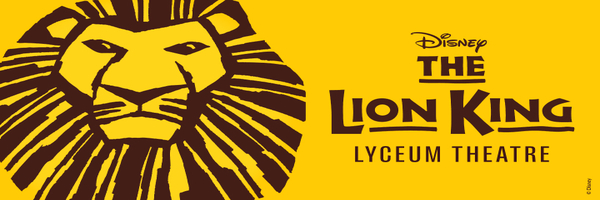Lyceum Theatre London
The Lion King

The Lion King is perhaps the most recognisable modern musicals and is currently playing to audiences at the Lyceum Theatre on the Strand. A global sensation, the musical is the brainchild of Elton John and Tim Rice and recounts the tale of the animal kingdom in Africa and the circle of life that surrounds them all.
To King Mufusa and Queen Sarabi a new lion cub is born - Simba. Although the crown rests heavily, the cub is instructed he will reign over the pride one day.
However that assumption neglects the ambitions of the King's brother, Scar, who with the birth of Simba is full of wrath that any chance to ascend to the throne now appears increasingly unlikely. Scar hatches a deadly plan.
He plots to overthrow the King and usurp the throne from the lion cub. Scar creates a stampede that causes the Mufusa to fall to his death and blames the accident on Simba, insisting that the pride will not follow a prince that destroyed their leader.
Simba has no reason to doubt his scheming uncle and leaves the pride in shame and self-imposed exile. His only friends are Timon the Meerkat and Pumbaa the Warthog who remain loyal and guide him through adolescence to adulthood.
A chance meeting with Simba's childhood companion Nala alters the course of Simba's destiny and the circle of life turns once more. Will Simba return to challenge for his rightful place among the pride? Get your Lion King tickets and book your seats for one of the best musicals in London!
History of the Lyceum Theatre
There has been a Lyceum Theatre on the Strand since 1765. If you want to see the original Lyceum Theatre designed in 1829 by architect Samuel Beazley you need only pop into the Lyceum Tavern on the Strand, situated next door to the existing theatre to see its origins. This is where the original theatre stood and the exterior features are remarkably similar to the one that occupied the site in the Early Victorian period.
The first incarnation was destroyed by fire in 1830 and the new theatre, opened in 1834, was repositioned on adjacent Wellington St.
In fact many of London's great theatres suffered extensive fire damage because of the inflammable nature of lighting practises that used naked flame and later the incendiary gas technology that followed.
Although the grand porticoes of Beazley's design still grace the theatre on Wellington St, the actual theatre is more a product of the 1904 redesign by architect Bertie Crowe.
Tom Taylor's adaptation of A Tale of Two Cities, with Dickens himself as consultant, played at the Lyceum in 1860, shortly after the end of its serialisation in Dickens' popular periodical All The Year Around.
Towards the end of the Victorian era the Lyceum was the home of two of theatre greats, Ellen Terry and Henry Irving, who utilised the grand design to produce poetical spectaculars including the Merchant of Venice and King Lear with Irving and Terry playing the leading roles of Lear and Shylock and Cordelia and Portia respectively.
Tyrone Power, the dashing Hollywood film star had a strong connection to the Lyceum. Both his grandmother and great grandmother appeared on stage at the Lyceum in the 1860's.
The theatre was a well known opera venue in the early days and witnessed the debut of classics such as Cosi Fan Tutte by Mozart. However there was also a strong desire by theatre managers of the day to produce English operas and as such composer John Barnett produced a number of works in the first few years of the theatre, including The Mountain Sylph (1834) credited as the first modern English opera.
It was followed by Fair Rosamund in 1837 and Farinelli in 1839 (both at the Theatre Royal, Drury Lane), and Blanche of Jersey at the Lyceum in 1840. In 1841–43 Irish composer Michael Balfe managed the theatre and founded the National Opera
The history of theatres across the west end of London can be attributed to a patchwork of different economic necessities. The Lyceum Theatre was converted into a cinema in 1937 and the original projection booth can still be seen, but the transformation lasted only 4 weeks when the theatre owners discovered that distribution rights were not available to them and the theatre was reinstated soon after.
The Lyceum was transformed into a ballroom in 1945 and called the Palais de Dance. In this incarnation the venue was actually very successful and many big bands played. This allowed the theatre a cultural shift and it became a rock venue hosting bands such as Led Zeppelin and The Who.
Yet by the mid 1980's the Lyceum was in a serious state of neglect and the future for one of the greatest theatrical venues was bleak.
The theatre was granted Grade II listed status in 1976 but unfortunately closed its doors to the public in 1986. At this point its illustrious 221 year career as an entertainment venue was under threat.
Then, just as the outlook seemed most uncertain the theatre was saved by funding from the National Lottery under ownership of the Apollo Leisure Group. It was completely refurbished and is now reinstated as one of the great theatrical venues of the West End. The Lion King joins the long list of successful productions to be staged at the site since its foundation way back in 1765.
The complex history of the Lyceum enters its next chapter but now the future is assuredly brighter. Yet who knows what the next one hundred years will bring. Only time will tell.